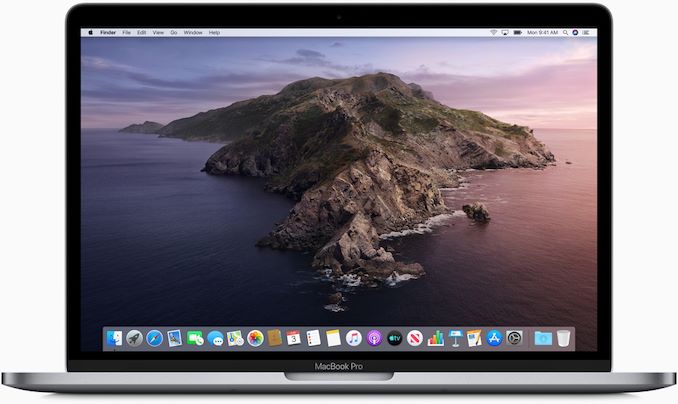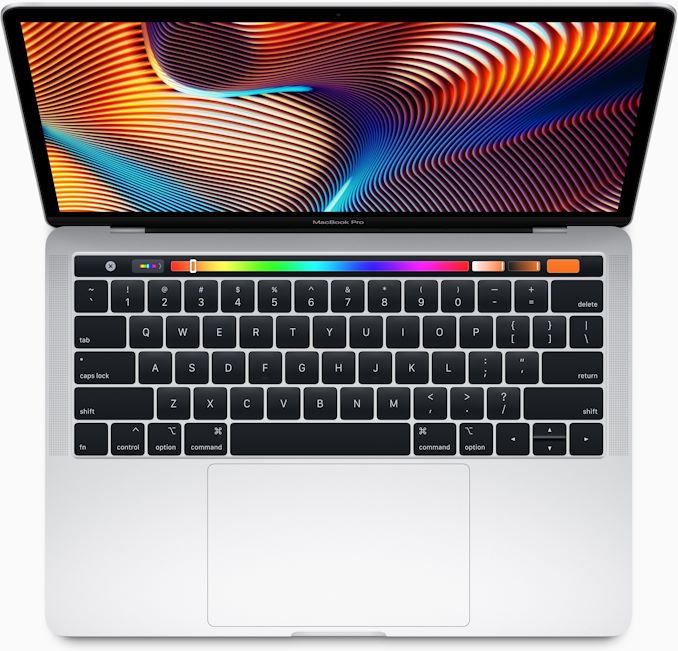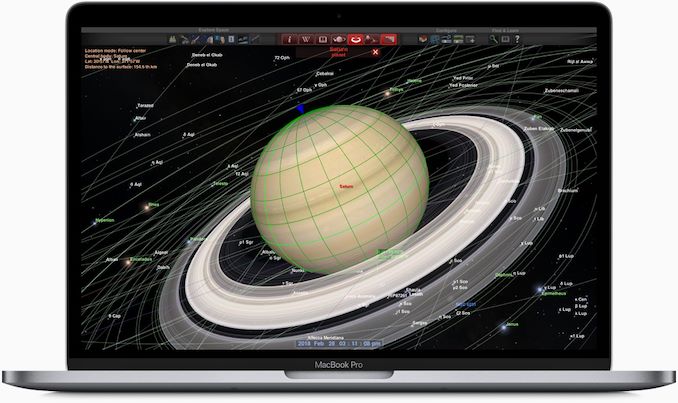Apple’s Entry-Level 13-Inch MacBook Pro Gets Quad-Core CPU & Touch Bar
by Anton Shilov on July 9, 2019 3:00 PM EST- Posted in
- Laptops
- Mac
- Apple
- MacBook Pro
- MacBook
- Notebooks
- Coffee Lake

Apple on Tuesday introduced a new version of its entry-level 13-inch MacBook Pro notebook, which has not seen an update since mid-2017. The new model continues to feature the renowned form-factor along with two Thunderbolt 3 ports, but it now comes with a quad-core CPU, a True Tone Retina display, a Touch Bar and Touch ID. The upgraded versions will replace existing cheap MBPs and therefore Apple will no longer offer its latest MacBook Pros without a Touch Bar.
The mid-2019 entry-level 13-inch MacBook Pro is based on Intel’s 8th Generation quad-core Core i5/i7 processor with Iris Plus Graphics 645 integrated GPU. It is accompanied by 8 or 16 GB of LPDDR3 memory as well as an SSD offering 128 GB – 2 TB capacity. These machines are placed between the more advanced MacBook Pros with four Thunderbolt 3 connectors and the new MacBook Airs (introduced earlier today). The more expensive 13-inch MBP models introduced earlier this year come with considerably faster quad-core processors equipped with Iris Plus Graphics 655, whereas the cheaper MacBook Air notebooks feature dual-core CPUs along with UHD Graphics 617.
Unlike the previous-generation 13-inch MacBook Pro laptops, these new models have the same features as the higher-end SKUs, as they are equipped with Touch Bar, Touch ID fingerprint reader, and the Apple T2 Security Chip. Essentially, all new MacBook Pro machines will now have a Touch Bar (and no function keys), an indicator that the device turned out to be popular with software developers. Of course it remains to be seen whether Apple’s customers will be satisfied with such a design choice as many still need F keys for various special-purpose software (e.g., specific Windows programs).
| MacBook Pro 13-Inch 2019 (Base Models) | ||||
| Model | 2019 13-Inch Higher-End |
2018 13-Inch Entry-Level |
||
| CPU | 2.4 GHz/4.1 GHz Core i5-8???U 4 CPU Cores (Coffee Lake) |
1.4 GHz/3.9 GHz Core i5-8???U 4 CPU Cores (Coffee Lake) |
||
| GPU | Intel Iris Plus 655 (128MB eDRAM) |
Intel Iris Plus 645 (? eDRAM) |
||
| Display | 13" 2560 x 1600 IPS LCD DCI-P3 Gamut True Tone |
|||
| Memory | 8 GB LPDDR3-2133 | |||
| SSD | 256 GB PCIe SSD | 128 GB PCIe SSD | ||
| Touch Bar | Yes | |||
| I/O | 4x Thunderbolt 3 (supports DP1.2 & USB 3.1 Gen 2 modes), 3.5mm Audio |
2x Thunderbolt 3 (supports DP1.2 & USB 3.1 Gen 2 modes), 3.5mm Audio |
||
| Battery Capacity | 58 Wh | 58.2 Wh | ||
| Battery Life | 10 Hours | |||
| Dimensions | 1.49 cm x 30.41 cm x 21.24 cm | |||
| Weight | 3.02 lbs (1.37 kg) | |||
| Price | $1799 | $1299 | ||
When it comes to I/O capabilities, the new reasonably-priced 13-inch MacBook Pro notebooks also have the same features as the fully-fledged models (with the exception of two TB3 ports vs. four TB3 ports), including 802.11ac Wi-Fi + Bluetooth 5.0, a 720p HD webcam, a 3.5-mm headset jack, stereo speakers, a large touchpad.
Since cheaper versions of Apple’s 13-inch MacBook Pro laptops use the same chassis as other notebooks in the series, they feature the same weight and thickness (i.e., 1.37 kilograms and 1.49 cm). The machines are outfitted with a 58.2 Wh battery that enables up to 10 hours of operation on one charge.
Apple’s new entry-level 13-inch MacBook Pro notebooks with two Thunderbolt 3 ports are available today directly from Apple for $1,299 and $1,499 depending on the configuration. College students in the US can get a new MacBook Pro starting at $1,199.
Related Reading:
- Apple Refreshes 13 & 15-Inch MacBook Pros for 2019: Adds 8-Core Intel CPUs & Revised Keyboard
- Apple Updates MacBook Pro Family for 2018: More CPU Cores, DDR4, & Same Form Factors
- Apple Refreshes Mac Laptops: Pro, Vanilla, & Air All Get New CPUs
Source: Apple












39 Comments
View All Comments
PeachNCream - Tuesday, July 9, 2019 - link
New for you in 2019...LPDDR3...because fk you, that's why.Ninhalem - Tuesday, July 9, 2019 - link
Is there an actual low power version of DDR4? If not, then why would Apple sacrifice battery life for what might be slight increases in performance?axfelix - Tuesday, July 9, 2019 - link
There, it's just that Intel's 14nm chips never used it. Intel is like the one company still necessitating use of LPDDR3 for all of their thin laptops because LPDDR4 support always got pushed off with 10nm, when it's been in phones and everything else for years now.axfelix - Tuesday, July 9, 2019 - link
"There is," oopsSychonut - Wednesday, July 10, 2019 - link
Oh I thought LPDDR4 would make it for 14+++++.deil - Wednesday, July 10, 2019 - link
LPDDR4 have better wat/performance, so it WOULD end up better, but intel was like from 10+, it will be soon here.... for 5 years.ingwe - Tuesday, July 9, 2019 - link
I thought that was a Coffee Lake limitation? I am not sure though. What I hate is the 128 GB SSD. Just bump it to at least 256 GB already.AdditionalPylons - Tuesday, July 9, 2019 - link
Yup, and what's even more insulting is that the upgrade from 128 to 256 GB is $200! That's $1600/TB! This is in a world where you can buy a 1 TB Samsung 970 EVO for $170, except of course Apple doesn't have slotted SSDs because of the T2 chip.Samus - Wednesday, July 10, 2019 - link
Can't tell you how many MacBooks I've installed an OWC SSD upgrade in.Really, I can't. I lost count years ago. Apple was still pushing 64GB models at the low end until just a few years ago, it's ridiculous.
tipoo - Tuesday, July 9, 2019 - link
Because Intel won't support LPDDR4 until Ice Lake. Do people still not understand this?